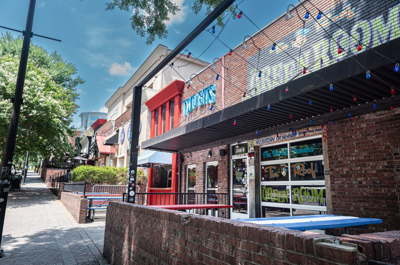A proposed Midtown Business Improvement District aims to duplicate downtown and The Gulch for a small slice of the city between Vanderbilt University and I-40.
Not so long ago, this corridor didn’t even have a name — locals might cite the old Great Escape or gesture vaguely and say, “Where West End meets Broadway” — but Midtown has grown up over the past decade. Skyscrapers and pricey condos have brought foot traffic to the area, which has two distinct nightlife hotspot clusters on Division Street and Demonbreun Hill, dozens of restaurants and steady spillover from the Vanderbilt universe.
Now a few proud neighbors want to raise a seven-figure budget to tend Midtown's streets. The plan would raise about $1.5 million annually from an additional 0.1561 percent fee on the assessed value of every property in the business improvement district. This money would then be managed by a separate board that could contract with a provider. Similar arrangements through the Central Business Improvement District (which covers much of downtown) and the Gulch Business Improvement District, both of which contract services through the Nashville Downtown Partnership, help fund services like power-washing and Nashville’s downtown ambassadors — a small corps that supplements city services, sometimes seen in signature yellow polos or roving on Segways.
Councilmember Jacob Kupin sponsors ordinance to expand district, says it will generate an estimated $8 million in tax revenue
Midtown residents envy the cleanliness of The Gulch and downtown, District 19 Councilmember Jacob Kupin says, and want to up the standard in public spaces around their own blocks.
“I went to Belmont — we’d go downtown and to Midtown, and just always noticed that downtown was a lot cleaner and nicer but didn’t know why,” Kupin tells the Scene. “ Then I got elected and learned about the business improvement district downtown. For Midtown, we wanted to see what stakeholders feel their neighborhood would benefit from. From that, we came up with a budget, we had meetings with residential buildings and their boards, I did outreach, sent flyers, made phone calls, and negotiated the final boundaries.”
Kupin has spearheaded the push for a Midtown Business Improvement District that would encompass 87 acres shared by council districts 17, 18 and 19. Along with a supportive resident who lives in The Adelicia, a luxury condo building on 20th Avenue, Kupin worked with the same consultant behind the city’s other two BIDs and started gauging public opinion. This week — joined by District 18 Councilmember Tom Cash, a co-sponsor — Kupin set out the details in legislation that will come in front of his chamber colleagues at the body’s Nov. 4 meeting. District 17 Councilmember Terry Vo tells the Scene that yet another BID gives her “pause,” but she looks forward to hearing more of Kupin’s reasoning at next week's council meeting.
While dedicated money could help fund additional area upkeep and public safety efforts, the additional cost to businesses will likely raise rent or sales prices.
“ It depends on kind of the operator,” says Kupin, who has spent the past few months talking to residents and business owners in the BID’s proposed boundaries. “ There've been a number of conversations I've had with property owners who have triple-net leases who say, ‘Sounds like a cool idea, please talk to my tenant because they're the one that's gonna pay this.’”
The BID could also put even more real estate in play for the Nashville Downtown Partnership. Both the Gulch BID and Central BID are almost pure pass-through entities for the influential nonprofit, which represents many of the city’s powerful business interests. The council recently expanded the CBID despite a checkered year for the managing entity that included a destructive fire in the Nashville Public Library’s Church Street garage and NDP’s involvement in felony camping arrests of unhoused people downtown by state troopers.
After the Nov. 4 council meeting, the legislation will likely reach its third reading on Dec. 16, at which time Davidson County residents can speak on the bill during a public comment period.






